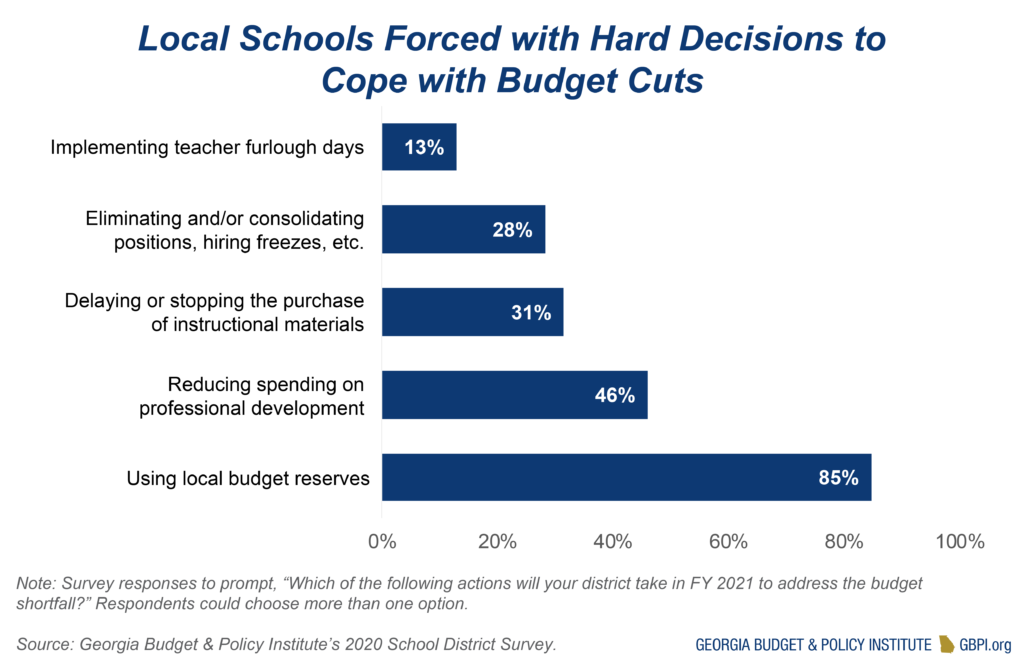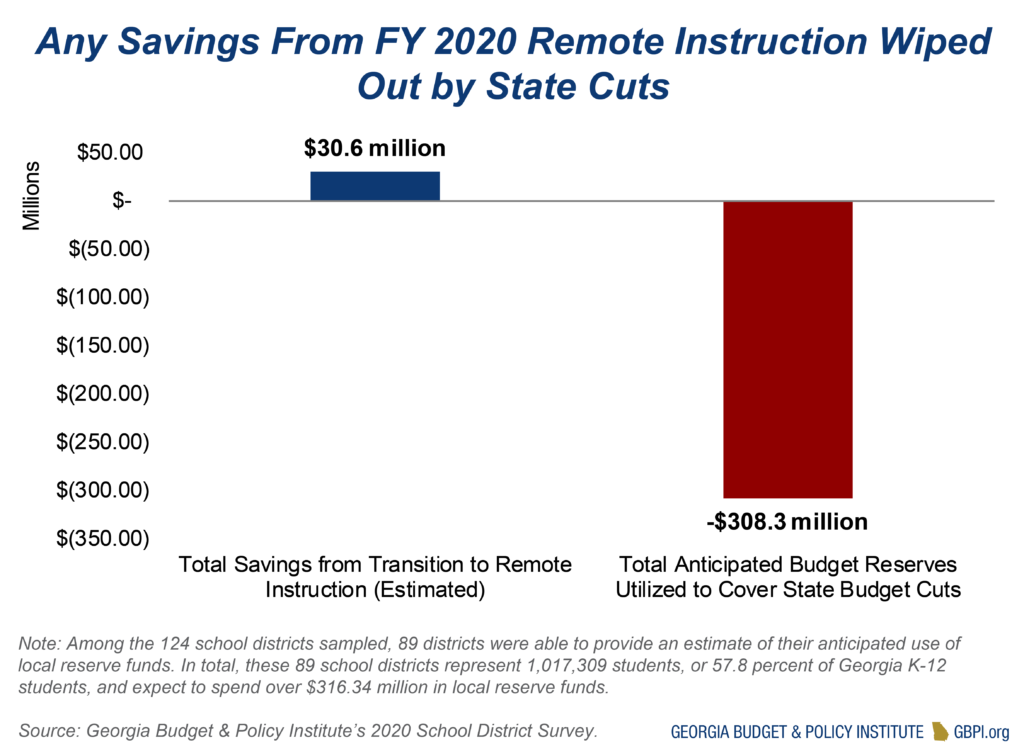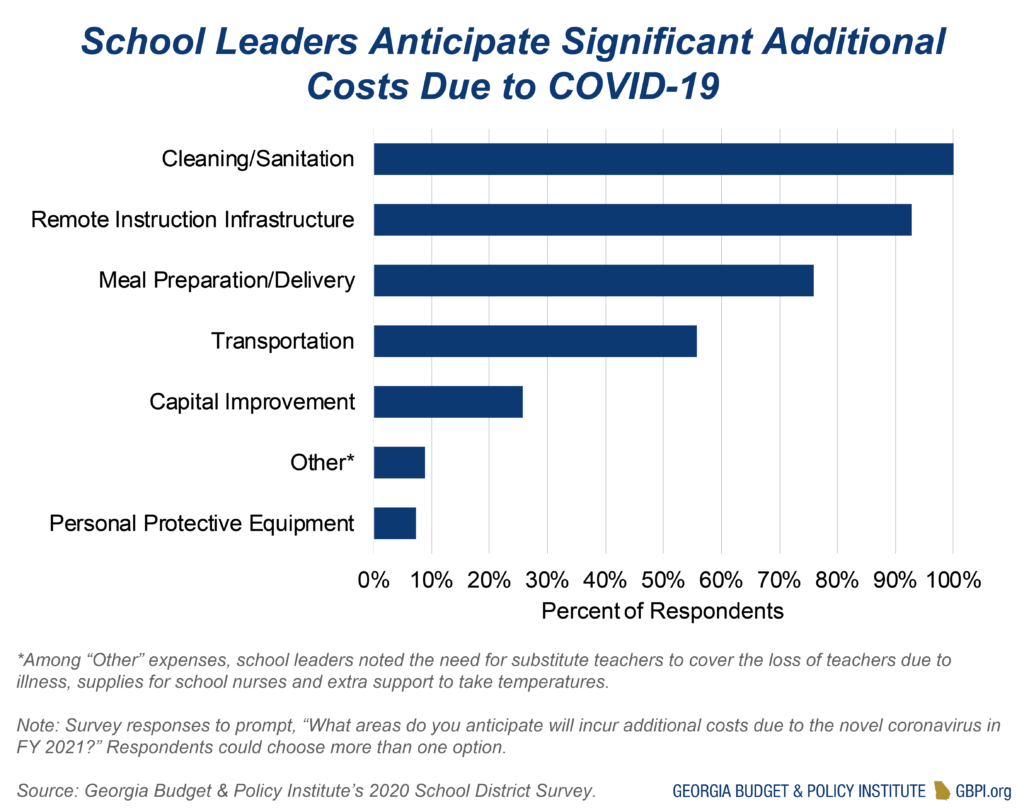Each year, the Georgia Budget & Policy Institute sends a survey to every public school superintendent in Georgia to gather information on the current state of education, what improvements need to be made and how lawmakers can address the problems Georgia schools face. This year, school superintendents or other central office staff from 124 of Georgia’s 181 school districts responded to the survey, representing 1.4 million public school students, or 83 percent of all students in the state.
What follows is a summary of the survey responses, and what they can tell us about education in Georgia for the upcoming year. We have included respondents’ quotes to contextualize specific perspectives. Names have been used with permission. You can see the full results of the survey here.
Budget Cuts
Due to lagging revenues caused in part by the novel coronavirus, Georgia lawmakers passed a budget with $2.2 billion in cuts. Local schools face a $950 million shortfall for FY 2021, which began July 1.[1] When asked how school leaders would deal with the loss of state dollars, 85 percent of respondents stated that they would utilize reserve funding. Additionally, of the 124 district responses, 57 (46 percent) responded that their school district would reduce spending on professional development (PD) for instructors. This decrease in PD is striking considering the pedagogical changes necessary to teach children remotely. The chart below shows the breakdown of responses.


During the initial shift to remote instruction in March, there was speculation that schools would see savings due to less need for services such as school transportation.[2] Some school leaders noted in the survey that they had, in fact, experienced savings in the last months of the 2020 school year.
However, these reduced expenditures pale in comparison to the funds lost by the current budget cuts, so schools will have to pull from reserves. A comparison between FY 2020 savings and the budget reserves that school leaders will use to make up the FY 2021 financial shortfall is below.
Within the 89 school districts that responded that they plan to utilize budget reserves, school leaders expect to deplete, on average, 34 percent of their local “rainy day funds.” However, this average is not evenly distributed. Thirteen of the school districts surveyed anticipate depleting the totality of their local reserve funds in FY 2021. These 13 districts represent more than 250,000 students, or 25 percent of the representative population surveyed in this question. Many respondents connected their district’s situation to the ability to raise local revenue through property tax millage rates. One mill is equal to $1 out of every $1,000 of property value.
Impact of COVID-19
When asked what additional costs might be incurred due to the pandemic, 100 percent of respondents expect additional cleaning and sanitation costs. Other common concerns include costs incurred from remote learning (93 percent) and meal preparation and delivery (76 percent). The full breakdown of answers is below.
Future Budget Cuts
When lawmakers passed the Fiscal Year (FY) 2021 budget with a $1 billion cut to the state’s public education system, they simultaneously refused to raise key revenue sources that would have mitigated the harm of the financial losses due to the pandemic. Proposals to raise the tobacco tax or close tax loopholes were rejected in favor of cutting an education budget that has only been funded fully for two of the last nineteen years.[3] When offered a choice between raising revenue or continuing budget cuts, school leaders sided with the majority of Georgians in supporting common-sense revenue raisers.[4] Of the 113 respondents to this question, 83 supported raising revenues while only five preferred budget cuts. Twenty-five answered that they were unsure.
Conclusion
Georgia public school leaders are facing looming costs that must be addressed in order to educate students in the pandemic while also ensuring safety. The budget cuts have forced districts to make difficult choices such as reducing expenditures on necessary instructional materials in order to meet the shortfall. In the face of these challenges, Georgia lawmakers would be wise to raise revenues to support students and the communities they are a part of.
Acknowledgements
The Georgia Budget and Policy Institute would like to thank the school districts that participated in the survey. School leaders provided extensive data, thoughtful responses and wise feedback. Their attention and effort are greatly appreciated. District leaders, school leaders and educators have our admiration and gratitude for the work they do each day to serve Georgia’s students.
Appendix A: Methodology
Dr. Stephen Owens developed this survey. Emmett Allen, who interned with GBPI during the summer of 2020, distributed the survey, supported respondents with any questions and analyzed results. A link to the survey, which was online, was sent by email to every superintendent in the state. GBPI subsequently contacted districts via phone and email to request their participation over a period of three weeks.
The survey was available in July of 2020. Participation was voluntary. Participating districts identified a contact person for follow-up information requests. Districts’ responses were available to all contact persons for their review. GBPI exported a spreadsheet of each district’s responses.
[1] Kanso, D. (2020). Georgia budget trends primer for state fiscal year 2021. Georgia Budget and Policy Institute. https://gbpi.org/georgia-budget-trends-primer-for-state-fiscal-year-2021/
[2] See: Filbin, P. (2020, May 29). School districts in Northwest Georgia grapple with potential 14% budget cut. Chattanooga Times Free Press. https://www.timesfreepress.com/news/local/story/2020/may/29/school-districts-northwest-georgia/524181/
[3] Lee, J., & Owens, S. (2020). Georgia education budget primer for state fiscal year 2021. Georgia Budget and Policy Institute. https://gbpi.org/georgia-education-budget-primer-for-state-fiscal-year-2021/
[4] Prabhu, M. T. (2020, May 27). Poll: Most Georgians support tobacco tax increase to boost state budget. The Atlanta Journal-Constitution. https://www.ajc.com/news/state–regional-govt–politics/poll-most-georgians-support-tobacco-tax-increase-boost-state-budget/hrkzp5QjXHKPynzZJtzqJO/















